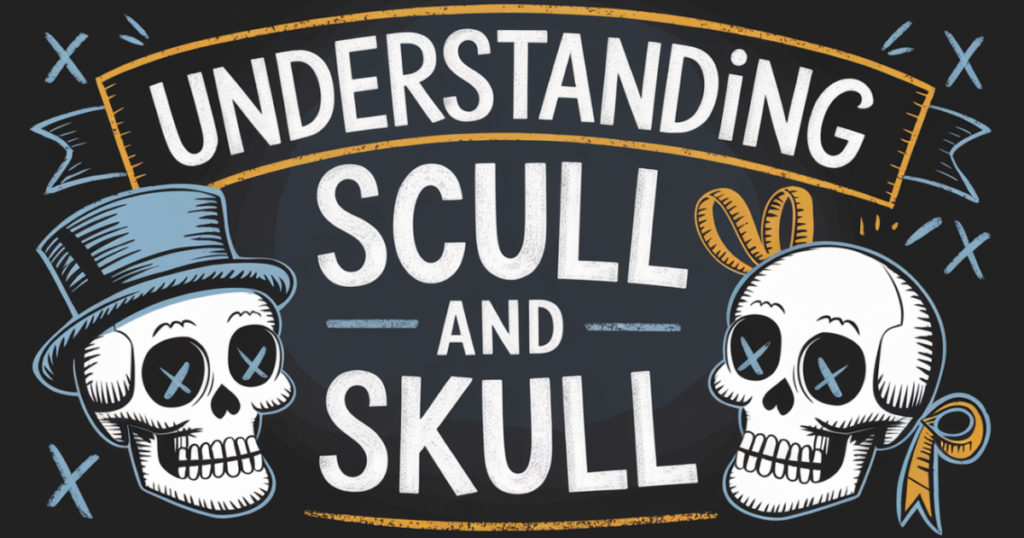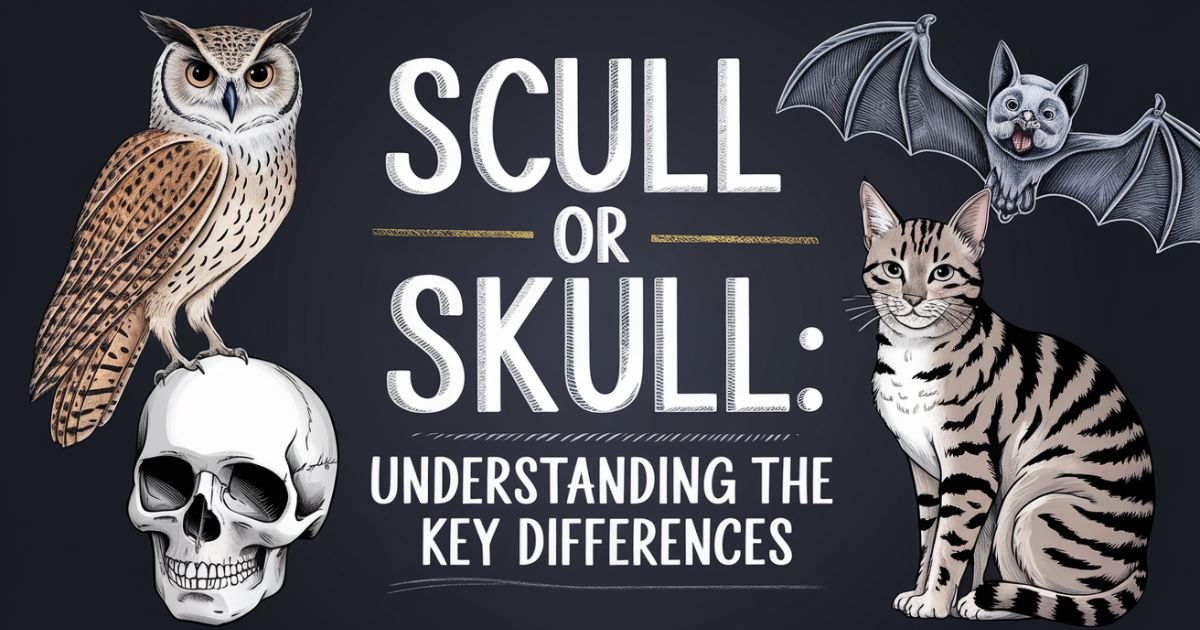When it comes to the words scull or skull, many people often confuse the two due to their similar pronunciation and spelling. However, these words have very different meanings and uses. Understanding the distinction between “scull” and “skull” can help clarify your writing and prevent misunderstandings.
“Scull” typically refers to a type of small boat or a rowing oar used in sports, while “skull” refers to the bony structure that forms the head of vertebrates, protecting the brain. Knowing when to use each term correctly is essential for clear and accurate communication in both everyday conversations and professional writing.
Understanding Scull And Skull

Scull: Definition and Usage
A “scull” refers to a small, narrow boat used in rowing, typically designed for one or two people. It can also describe the oars used to row such a boat, which are usually handled individually rather than in pairs.
In the context of sports, sculling is a rowing technique where each rower uses two oars, one in each hand. The term “scull” can also refer to a specific type of racing boat used in competitive rowing. This word is mostly used in the context of water sports and boating activities.
For Example
- The rower expertly maneuvered the scull through the calm water during the competition.
- She trained daily to improve her sculling technique and gain speed in the regatta.
Skull: Definition and Usage
The “skull” is the bony structure that forms the head of vertebrates, including humans, and protects the brain. It also houses sensory organs such as the eyes, ears, and nose. In medical terms, the skull plays a crucial role in cranial protection and support for facial features.
The term “skull” is commonly used in anatomy, biology, and even in popular culture as a symbol of danger or death.
For Example
- The doctor carefully examined the skull to check for any fractures after the accident.
- The archaeologists uncovered an ancient skull during their excavation of the burial site.
You Also Like To Read This: Batton Or Baton: Which One Is Correct?
How do you use the word scull in a sentence?
You can use the word “scull” in a sentence like this:
The athlete trained hard to perfect her sculling technique before the upcoming race.
How do you use the word skull in a sentence?
You can use the word “skull” in a sentence like this:
The archaeologist carefully studied the skull to determine the age and health of the ancient human.
Scull and skull definition, parts of speech, and pronunciation
Scull
- Definition: A “scull” is a small boat used in rowing, or the oars used to row it. It can also refer to the act of rowing such a boat.
- Part of Speech: Noun (when referring to the boat or oar); Verb (when referring to the action of rowing)
- Pronunciation: /skʌl/ (rhymes with “dull”)
Skull
- Definition: A “skull” is the bony structure that forms the head of vertebrates and protects the brain. It includes the facial bones and the braincase.
- Part of Speech: Noun
- Pronunciation: /skʌl/ (rhymes with “dull”)
Side-by-Side Comparison
| Word | Definition | Part of Speech | Pronunciation | Usage | Key Difference |
| Scull | A small rowing boat or the oars used to row it; also refers to the action of rowing | Noun (boat or oar), Verb (rowing) | /skʌl/ | Used in sports like rowing to refer to the boat or action of rowing | Refers to a type of boat or rowing technique, not related to the head or bones. |
| Skull | The bony structure that forms the head, protecting the brain | Noun | /skʌl/ | Used in anatomy and biology to refer to the human or animal head structure | Refers specifically to the bone structure in the head, protecting the brain. |
The main difference between “scull” and “skull” lies in their meanings and usage. “Scull” refers to a small boat used in rowing or the oars used to row it, and is often related to sports. In contrast, “skull” refers to the bony structure in the head that protects the brain, and is used in anatomy and biology.
Despite their similar pronunciation, they are completely different terms with distinct applications.
Everyday Usage Examples

Here are some usage of scull and skull in daily conversation. Now we see some examples to illustrate the difference:
Scull
- The rower grabbed the scull and prepared for the race on the lake.
- She perfected her sculling technique, aiming for a personal best in the regatta.
- The coach demonstrated how to hold the scull properly to avoid injury.
- During practice, the team focused on efficient baton exchanges in the scull.
Skull
- The archaeologists uncovered an ancient skull during their excavation of the site.
- He had a CT scan done to check for any damage to his skull after the accident.
- The skull of the dinosaur was on display at the museum.
- The doctor explained how the skull protects the brain from injury.
FAQs
What is the meaning of the word “scull”?
“Scull” refers to a type of small boat used in rowing or the oars used to row it. It can also refer to the action of rowing with such oars.
Why is it called sculls?
The term “sculls” comes from the Old Norse word “skop,” meaning a small boat or oar. It’s used to describe both the rowing oars and the boats themselves.
What is the difference between scull and oar?
An “oar” is a general term for a tool used to row a boat, while “scull” specifically refers to a type of boat or the small, paired oars used in sculling.
What is the difference between sculls and rowing?
“Sculls” refers to a specific type of boat or rowing technique using two oars, while “rowing” is a general term for the sport or action of propelling a boat using oars.
Conclusion
In conclusion, “scull” and “skull” are two distinct words with very different meanings, despite their similar pronunciation. “Scull” refers to a type of small boat or the oars used in rowing, primarily in sports. On the other hand, “skull” is a term used in anatomy, describing the bony structure that protects the brain.
Understanding the key differences between these two words ensures clear communication and helps avoid confusion. Whether discussing sports or biology, using the correct term is essential for accuracy and understanding.

Grammerlytips.com, authored by Jame, offers expert tips and insights on mastering grammar, enhancing writing skills, and boosting communication effectiveness.

